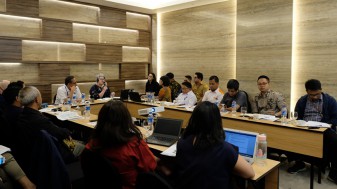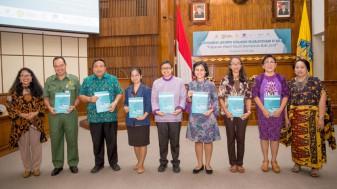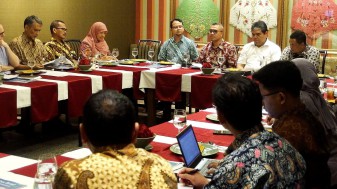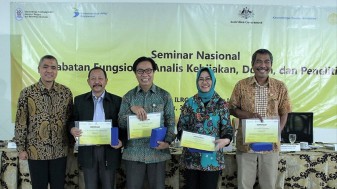The existence of policy analysts is crucial to promote evidence-based policy formulation. Leaders of government institutions, both at the national and subnational level, need to optimise the role of policy analysts so that they can produce high-quality policies, especially in responding to the pandemic.
This is one of the topics discussed in the policy discussion themed “The Important Role of Government Think Tanks in Pandemic Recovery,” held online by Knowledge Sector Initiative (KSI) with Katadata on Friday (16/4). Resource persons for this discussion included the Deputy for Institutions and Administration Division of the Ministry of Administrative and Bureaucratic Reform (Kemenpan RB), Rini Widyantini, Secretary of the Ministry of Research and Technology/First Secretary for the National Research and Innovation Agency (Kemenristek/BRIN), Mego Pinandito, Director of State Apparatus of the Ministry of National Development Planning/National Development Planning Agency (KemenPPN/Bappenas), Prahesti Pandanwani, and Head of the Policy Analyst Development Centre of the State Administration Institute (LAN), Elly Fatimah. This discussion was broadcasted live on Katadata’s Youtube channel, moderated by Mulya Amri, and opened by the Expert Staff in Political and Legal Division of Kemenpan RB, Muhammad Imanudin, representing the Minister of Administrative and Bureaucratic Reform (Pan RB), Tjahjo Kumolo.
This webinar also involved policy research organisations and the Researcher for the Regional Autonomy Implementation Monitoring Committee (KPPOD), Sarah Nita Hasibuan, to identify strategies that enable collaboration and knowledge sharing among functional officials. Knowledge-to-policy is not only important for the COVID-19 pandemic recovery, but also in line with “Indonesia Maju” vision, which aims to improve effectiveness and efficiency of bureaucratic business processes.
In 2019, the President of the Republic of Indonesia, Joko Widodo, issued his mandate to simplify the bureaucracy, whereby structural positions would be reduced to two levels and shifted to functional positions that value expertise and competence. This simplification of the bureaucracy is intended to create a dynamic, agile, and professional bureaucracy to support the government’s performance.
Elly Fatimah from LAN said that to date, policies made by the government are not entirely evidence-based. Many research results have not been used by policymakers when making policies. This is where policy analysts come into play. Policy analysts can serve as the information intermediary, knowledge and research result translator for policymakers, and so forth. “Policy analysts hold many functions. This can be used in each stage in the policymaking cycle,” she said.
According to her, the policy analyst functional position is still relatively new. As a result, the role of this position has yet to be fully understood by all stakeholders, especially leaders or direct supervisors of the holders of these policy analyst positions. Therefore, LAN has published a guidebook that serves as a reference for leaders and direct supervisors of policy analysts, enabling them to optimise the policy analyst role in policy formulation, particularly during the pandemic. The book entitled “Guideline to Optimise the Role of Policy Analyst Functional Position” is published by LAN, in collaboration with a team from the Gadjah Mada University, supported by KSI.
Rini Widyantini from Kemenpan RB explained that, from a governance perspective, the current bureaucracy is required to change from a traditional to a responsive pattern. It is an inevitability that research must be the basis in the policymaking process. Until today, government institutions relevant to research are spread across many organisations, and each of them produces studies. However, this pattern made these research organisations to be disconnected from each other. BRIN acts as the answer to consolidate all that. “With one integrated agency, we expect that policies are done in a more integrated way. For that, we need better innovation and working relations mechanism,” she said.
She added that the presence of BRIN has opened more opportunities to promote evidence-based policy. In this context, policy analysts serve as an essential organ in evidence-based policymaking.
Prahesti Pandanwani from the Ministry of PPN/Bappenas explained that in the policymaking process, the Ministry of PPN/Bappenas implements a role of clearing house. Bappenas uses the National Mid-Term Development Plan (RPJMN) as a reference to examine the strategic plan consistency of each ministry with the President’s vision and mission. Synergy is crucial to ensure efficiency and effectiveness in policy formulation and implementation. “We develop many policy studies, so we definitely need to collaborate with various parties,” she added.
Synergy
Mego Pinandito from the Ministry of Research and Technology/BRIN said that in the context of innovation ecosystem, in order to synergise, each party must know each other well. All this time, research information is less known; thus expanding research publication becomes essential. In addition, there needs to be clear arrangements and programs. For research, for example, the direction can refer to the National Research Master Plan (RIRN). Furthermore, research activities need to be monitored in a way to make them run smoothly, thus generating real benefits for the people. Ventilators and GeNose are examples of useful research results at the right time.
Regarding synergy, Elly Fatimah from LAN explained that research and innovation can no longer be implemented by one type of functional position. Even a policy analyst cannot work alone. Everyone needs to collaborate according to their respective competency. “We have to cooperate from the beginning in order to tackle a problem from various perspectives,” she added.
Sarah Nita Hasibuan from KPPOD thought that consolidation across ministries, institutions, and disciplinaries needs to happen in order to mitigate various risks in many different developmental areas. KPPOD’s study found that the current public policy formulation does not sufficiently accommodate its multidimensional impact. The institutional aspect of research and development seems to be separated from policymakers, and functional positions usually are only involved at the beginning of the policymaking process. Additionally, there is no clear legal basis that regulates that a policy must be formulated through the approval of policy analysts. As a result, the use of research results as the basis of policymaking is heavily reliant on who the policymakers are when high-quality policy should be born through policy analysts’ studies. Therefore, it is necessary to strengthen the institutional aspect of research in policy formulation, improve the human resource capacity, and gain budgetary support to ensure the sustainability of high-quality research as the foundation for policy formulation.
In the last five years, KSI has collaborated with KemenPANRB and LAN, both technically and strategically, to optimise the function of policy analysts and advocate policy recommendations that are in line with efforts to improve the quality of public policies.
In the long run, strengthening the role of state civil apparatus (ASN) will improve the efficiency and effectiveness of state administration and enable the knowledge and innovation ecosystem to work even better. The need to answer challenges in the digital era and recovery from the pandemic can potentially be addressed by simplifying bureaucracy, conducting internal consolidation within the government, and carrying out external collaboration with non-governmental organisations.





